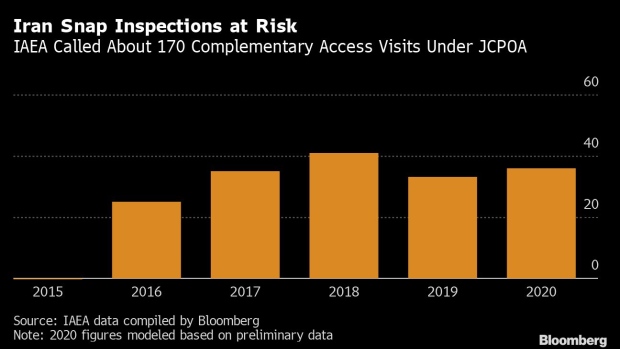Mar 1, 2021
Iran, U.S. Warned Not to Use Atomic Monitors as Bargaining Chips
, Bloomberg News

(Bloomberg) -- Atomic monitors sought to prevent their work being further derailed by the tense standoff over Iran’s nuclear program, as U.S. and European diplomats decide this week whether to formally censure Tehran.
The International Atomic Energy Agency’s investigators, who have carried some 170 short-notice visits to sites in Iran over the last four years, are the most recent causalities in the dispute. They lost their right to call snap inspections and visit key installations last month when Iran suspended the agency’s so-called Additional Protocol.
“This is a huge loss,” IAEA Director General Rafael Mariano Grossi said at a briefing Monday. “You don’t know whether you can sleep at night or worry because you don’t have the inspections.” The agency’s work shouldn’t become a “bargaining chip” in negotiations, he said.
The IAEA’s 35-member board of governors convened its quarterly meeting in Vienna. Topping the agenda is Iran’s accelerating nuclear activity, along with a stalled investigation into the presence of uranium traces at several undeclared sights inside the country.
Iran has threatened to tear up a temporary understanding with IAEA inspectors if Europe and the U.S. pursue a formal rebuke. “Introduction of any resolution in complete disregard of the current level of constructive interactions with the agency is not merely disappointing but absolutely counterproductive and destructive,” Tehran’s IAEA mission wrote in a two-page letter seen by Bloomberg.
The IAEA meeting is shaping up as a key test that could determine whether Iran and the U.S. can salvage a crumbling 2015 nuclear accord that lifted sanctions in return for limits on Tehran’s atomic program.
Former U.S. President Donald Trump withdrew from the accord and reimposed penalties in 2018 as he sought to weaken Iran economically and militarily. Iranian authorities subsequently violated key nuclear covenants as tensions threatened to spark a regional conflict.
Both sides are insisting that the other has to move first in order to rejuvenate the deal. But on Monday, Iran’s Foreign Ministry said now wasn’t the right time for direct talks with the Biden administration and European powers.
The U.S. “can’t continue to uphold the maximum pressure policy and sanctions” and sit at the negotiations table, spokesman Saeed Khatibzadeh said in Tehran.
©2021 Bloomberg L.P.


